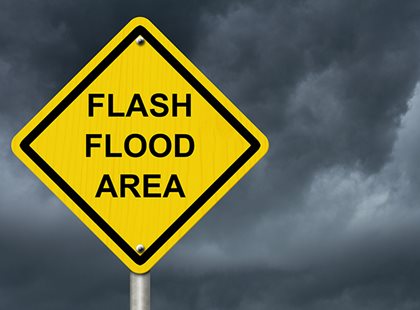Friday October 02, 2015
In many parts of the country, flash flood watches and/or flash flood warnings are often issued during torrential downpours, especially in hurricane-prone and/or low-lying areas. Flash floods can be damaging and even deadly, so when an alert is issued in your region, it’s very important to remain alert and take action to ensure the safety of you and your family. But do you know what these alerts mean, how to prepare and what you should do? We’ve compiled some valuable information about what flash floods are, how to prepare and what to do when they occur.What is a flash flood?
 As its name implies, a flash flood signifies rapid flooding that occurs in a short amount time – anywhere from a few minutes to about six hours. It is most often caused by heavy or steady rain brought by thunderstorms, tropical storms or hurricanes, and can also result from dam failures or rapidly melting snow or ice. Flash flooding may also occur when repeated rainstorms affect already saturated soil or dry soil unable to absorb a large volume of water. In all of these cases, flowing precipitation is channeled through streams or combines with other volumes of water, producing a quickly-moving and potentially destructive torrent of water and collected debris. What makes flash flooding especially dangerous is that it can occur when there is no rainfall in a local area at all – in that case, there is heavy precipitation affecting an area upstream.
As its name implies, a flash flood signifies rapid flooding that occurs in a short amount time – anywhere from a few minutes to about six hours. It is most often caused by heavy or steady rain brought by thunderstorms, tropical storms or hurricanes, and can also result from dam failures or rapidly melting snow or ice. Flash flooding may also occur when repeated rainstorms affect already saturated soil or dry soil unable to absorb a large volume of water. In all of these cases, flowing precipitation is channeled through streams or combines with other volumes of water, producing a quickly-moving and potentially destructive torrent of water and collected debris. What makes flash flooding especially dangerous is that it can occur when there is no rainfall in a local area at all – in that case, there is heavy precipitation affecting an area upstream.Flash flood alerts
When flash floods may or do occur, the National Weather Service issues two types of alerts: Flash flood watches and flash flood warnings.Flash flood watch: Flash flood watches are issued when conditions are likely to favor the formation of flash floods.
Flash flood warnings: Flash flood warnings issued to notify you that a flash flood is happening right now, or will occur imminently.
Flash flood safety tips
Preparing for flash floods:
- Secure outdoor furniture or if possible, move it indoors.
- If your home has two or more stories, move important items upstairs.
- Place important papers, records, insurance information, etc. in waterproof containers
- Compile a preparation kit of essential items you can take with you if you need to evacuate. If you’ve already packed a Hurricane Preparation kit, you’re already there. If not, here are some suggestions:
- Food and Water: Non-perishable, easy-to-prepare food plus and one gallon of water per person, per day, for at least three days
- One or more flashlights with extra batteries
- Battery-powered radio, TV, lantern
- First aid kit
- Prescription and over-the-counter medications
- Food—at least a 3-day supply of non-perishable, easy-to-prepare food
- Personal health and hygiene articles for each member of the family
- Baby food and toys
- Pet food, toys, leash and crate
- Garbage bags
- Rain gear
- Cell phones and chargers
- Emergency contact information for family, friends, property manager, insurance agent, etc.
- Extra cash
- Camera to document damage
- Food and Water: Non-perishable, easy-to-prepare food plus and one gallon of water per person, per day, for at least three days
When flash floods occur:
- Move immediately to higher ground and stay there, even if you haven’t received instructions to do so. Remember, minutes count.
- If you choose to leave or are told to evacuate your home, turn off utilities and disconnect electrical appliances. Do not touch electrical equipment if either you or the equipment is wet or if you are standing in water.
- Do not walk through moving water – you can lose your balance in just six inches of flow. If you must walk through water, be sure it is still. Here’s a tip: use a stick or similar object to check how firm the ground is before you step forward.
- If you must drive, be sure to avoid areas known to be flooded. If water begins to rise around your car, abandon the vehicle and move to higher ground, if possible. Fast-moving floodwaters can engulf and sweep cars away very quickly.
- If you park your car, avoid stopping near streams, rivers or other flowing bodies of water.
Contact FirstService Residential, North America's property management leader, to learn more.